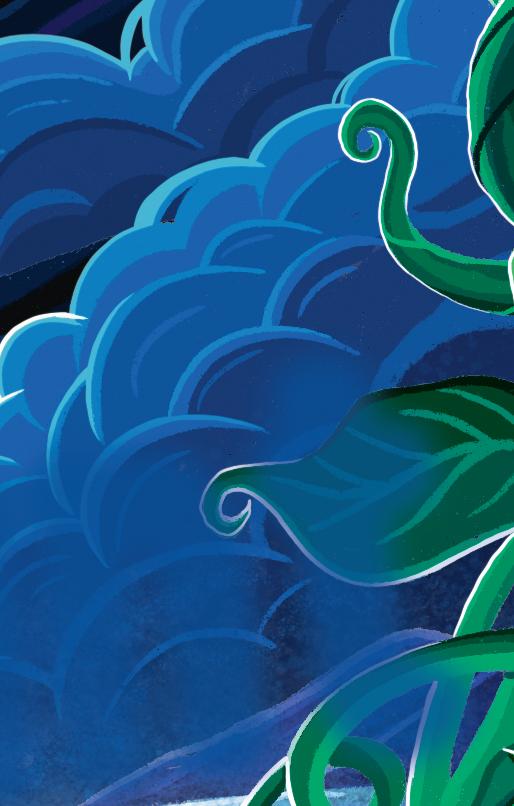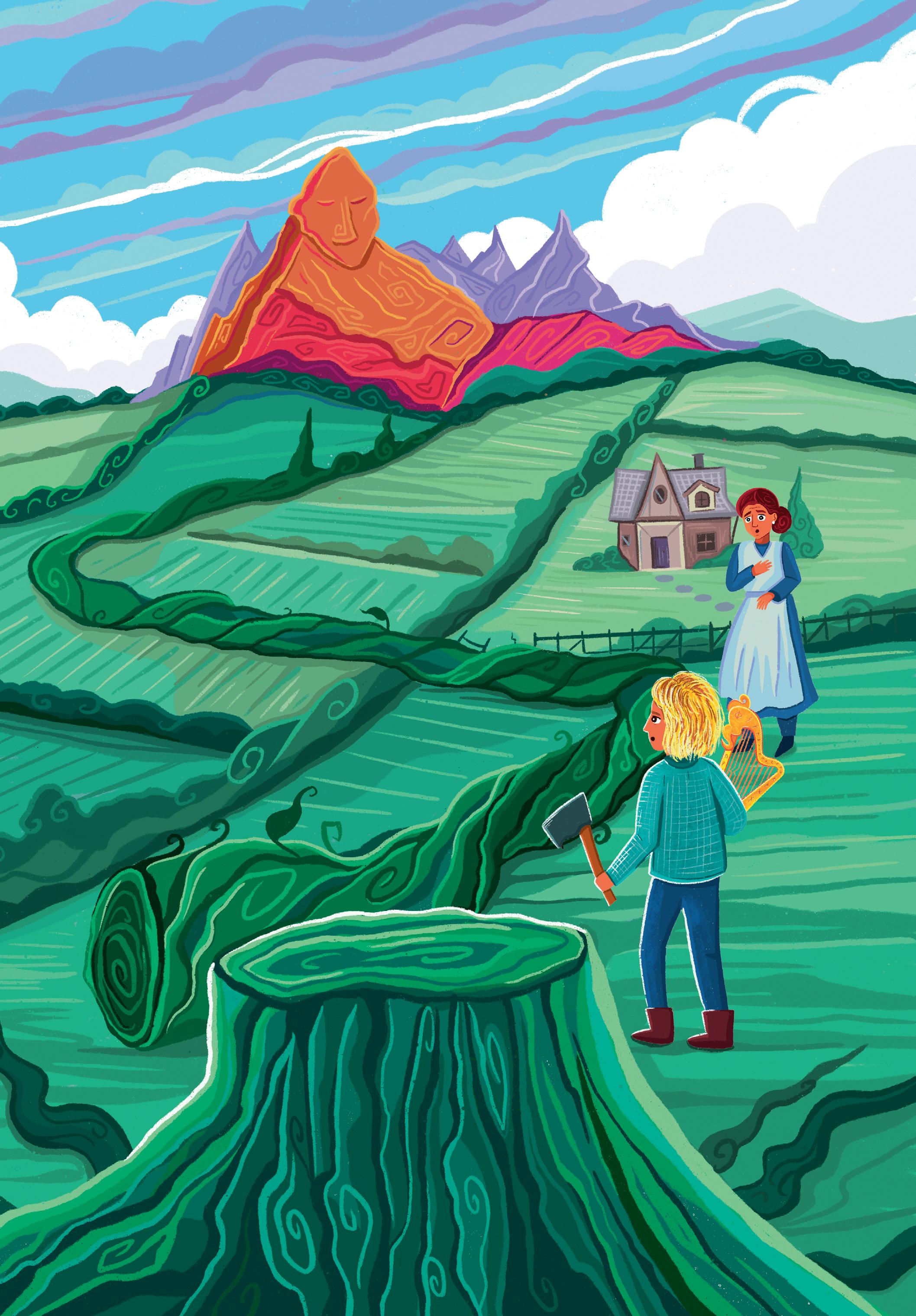JamGiant and the















Illustrated by Hazem Asif


Once upon a time, there was a boy called Jack. Except that’s not quite right. There are lots of boys called Jack, in stories and rhymes. Falling down hills with their sisters, jumping over candlesticks, bringing in the frost that forms on the windowpanes. You could read any number of tales about these mischievous Jacks, with their messy hair and lazy smiles, going on adventures and returning home with rich rewards. This isn’t one of them.
However, the fact remains that almost 20 years before our story begins properly, there was a boy called Jack, and he had just cut down a beanstalk. It hadn’t been an easy task – the stalk was thick and full of fibre; his hands were red and hard with calluses. But the beanstalk was now a stump, and there was a harp tucked under his arm. He paid no attention to either one. He was looking out at a mountain at the edge of his village, his eyes tracing its shape as though he were surprised to see it.

His mother emerged from their tumbledown cottage, wiping her hands on her apron.
“Well. What do we do now?”
This got Jack’s attention.
“Now? Now we are rich, Mother; there’s no need for us to do anything again.”
Jack ordered a grand house and gardens to be built where his former home had stood. Soon the whole village was under Jack’s employ, until it felt as though Jack’s house was the village somehow, and his heroism the village’s heroism.

After all, almost 20 years on, everyone knew the story of Jack and his beanstalk. How he had sold his cow for a handful of beans and been sent to bed without supper for it, only for a bean to grow and grow until it went all the way up into Giant Country – a place of terrible, vicious brutes who would have ground his bones to make their bread. How he had retrieved three priceless treasures from the hands of the giants – a bag of self-refilling coins, a hen which laid eggs of solid gold, and a singing harp –and brought them back to the village.
These treasures were a particular source of pride, and they were put on display in the finest room of the house. Once a year, children from the local school would be admitted to the house and paraded past them, so they might understand what a fine thing it was that their village had Jack.
Now this story can begin.

Jam had been looking forward to the school trip for a long time. She’d only lived in the village for two years, and last year’s trip had fallen on Eid, so she hadn’t been able to go. Like all the children in her school, most of her family worked at the house – but her parents were gardeners, and she’d never been inside. She’d never even seen Jack himself. She wondered what a hero looked like; whether he would be two metres tall with long flowing hair and a deep voice.

Jam’s full name was Jamila, but no one really used it. Everyone at school said “Jam” was easier to pronounce. Besides, Jamila meant beautiful in Arabic, a graceful, elegant kind of beauty, whereas Jam usually had garden dirt beneath her fingernails and smeared on her nose. She might have pulled it off if she’d been the kind of cheerful, confident girl who turned cartwheels, but she often found herself tongue-tied and shy around the other children.
Plants were much more reliable companions – there was a rhododendron in Jack’s garden that would extend its leaves to say hello, and a camellia that flowered as though it were laughing at her jokes.


“Can I have everyone’s attention, please?”
Jam jumped. She’d been lost in thought, staring at the mountain at the edge of their village, which always looked to her like a very sad, very old man. Her class were now lined up obediently outside the house, and Mr Ingot was running his eyes over the register.

“Remember, this is a very special day: you are here to see treasures that no one else in the world can get near. No eating or drinking, and absolutely no wandering off.”
The children around him nodded, and Jam looked at them curiously. They had all been on this trip every year since they were five years old – but no one was messing around or whispering. All their clothes were washed and freshly ironed too; Jam guiltily tried to hide the porridge stain on her sleeve.
“All right then, everyone, follow me – single file.”
The children marched obediently through the door, and Jam looked around her, her mouth falling open in awe.

The outside of Jack’s house was impressive enough, with bright blue bricks and polished marble columns, and an enormous glass extension almost as big as the house itself. But the hall had a huge spiral staircase, and the walls were covered from ceiling to floor in gold-embroidered tapestries, each showing a different part of Jack’s heroic story.
There he was clambering up the beanstalk; there he was meeting the giant. The artist had spared no detail in emphasising the giant’s ugliness. He was shown with violently-green skin, pointed teeth protruding over his upper lip, and beetle-like eyes which glittered maliciously.

Jam shivered, but lingered in spite of herself. The giant must have been ten times Jack’s size at least. Had he been afraid? She didn’t think she could have stood up in front of a giant without shaking from head to toe, but the artist had shown Jack with his hands heroically on his hips, his eyes shining and his hair flowing. Jam supposed it was difficult to embroider someone shaking.

“Still,” she said aloud. “He must have been a little bit afraid.”
“Of course he was.”
Jam spun around. An elderly woman stood on the stairs, draped in ermine and mink furs, her hair perfectly styled and her lipstick a perfectly pale pink. The effect was that of a rather regal ostrich.
“I – I’m sorry,” Jam stammered. For she knew who this must be. The Mother of Jack, who had once sent him to bed without supper.
“Of course he was afraid,” Jack’s mother continued. Her round country accent was still detectable, but she wrapped her mouth around every syllable she spoke, as though each were a chocolate plum in her mouth. “There was never so great a coward as my son. Ever since he was a boy, he was too afraid to work as a huntsman, or as a woodcutter, or a doctor. A proper profession, that I might have been proud of.”
“You can’t say that! He’s Jack – he’s a hero.”
“Hmph. If he is, he certainly hasn’t shown much sign of it since he chopped down that beanstalk. He isn’t rescuing children from ogres, is he? Or seeking treasure in dragons’ lairs?”
